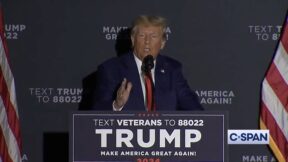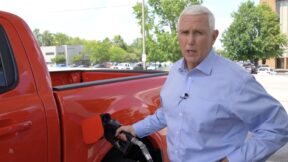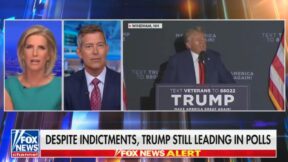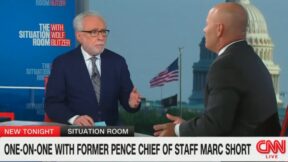Matt Lewis Pulls No Punches in Spelling Out How Shady Our ‘Filthy Rich Politicians’ Are — But Is Still Surprisingly Optimistic
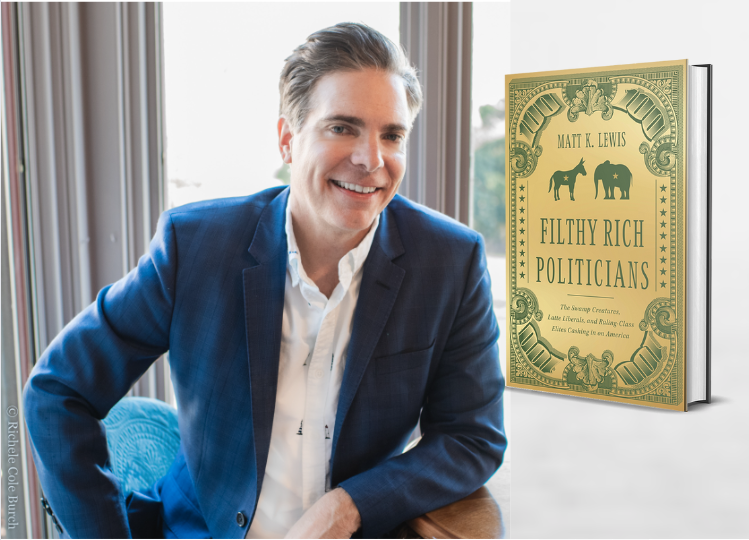
Photo provided by Matt Lewis
I expected a book titled Filthy Rich Politicians: The Swamp Creatures, Latte Liberals, and Ruling-Class Elites Cashing in on America to be full of sordid details about how our elected officials are cashing in on their political power to the detriment of everyday Americans — and author Matt Lewis certainly brings the receipts in the scrupulously-footnoted text — but the tale is also bookended by a surprising dose of optimism.
Lewis, a columnist for The Daily Beast, opens the book talking about his background as a middle class kid from the Maryland suburbs who became a Republican political operative before transitioning into media and commentary. Switch out western Maryland for central Florida and Lewis’ prison guard father and proofreader/homemaker mother for my own retired public school teacher parents and we’ve had some similar life experiences that affected our worldviews.
And there are many Americans who would likewise be inclined to nod along as Lewis writes about how “[n]ormal people are having a hard time making ends meet,” while “our political elites just keep getting richer.” It’s a multifaceted and complex problem, and Lewis takes unsparing look at the shenanigans and scandals of our elected officials across the full spectrum of the partisan divide — including some of his own former clients.
But still, Lewis urges his readers to not “let envy or bitterness control you” and “avoid falling prey to jealousy or negativity.”
“Capitalism has lifted more people out of poverty than any other system in the world,” he writes. “I do not hate the rich. But I love America. And one of the ways we can lose it is when the public stops trusting institutions, leaders, and elites.”
Key to this, writes Lewis, is “America remaining a place where, if you work hard and play by the rules, you can get ahead in life.” The following roughly 200 pages of his book then spell out some of the most egregiously flagrant ways our political elites are gaming the system for their own benefit, and then offers his suggestions for a series of practical reforms.
Mediaite spoke with Lewis by phone on Tuesday, the day of the book launch. Below is a lightly edited transcript of our conversation.
This was a fun read — very dishy. It felt a lot like I was reading things that I already knew, but now here was all the confirmation of it, seeing just the the level of detail in this book — the details that you’ve got about how the people who are making decisions about our lives are not just rich, but well-connected, and have these benefits, like the ability and financial security to not work or take off time from work, to campaign and not worry about their entire life being derailed.
When you were doing your research for this, what really stood out to you the most? Was anything that surprised you or anything that that you weren’t expecting to see?
I think it was the the realization that someone like me, despite the fact that I’m married to a political fundraiser — despite the fact that I’ve been working, in political journalism for like two decades — that even I couldn’t really have a chance of running and getting elected to Congress because I’m not rich enough. That really hit home to me. And the other thing is, I mean, I think we all sort of know the politicians are rich, tend to be rich. But until I actually went through and — at the end of the book, there’s a Business Insider ranking of the richest 25 members of Congress, if you look through that, that appendix of the richest 25, what you’ll find is that more than half, around 13 of the 25 got their money based on either marriage or inheritance.
And you can’t bootstrap your way up into that.
Yes. And so I think it hit home to me. It’s something that I sort of knew, but I hadn’t really grappled with or dealt with. And so even for me, someone who who has been pretty closely following politics for a long time, it really just sort of hammered home to me the extent to which money really matters in politics, and not just fundraising. Right? Because theoretically, if you’re willing to ask people to support to donate to your campaign, you could hustle and you could raise the money. But you kind of have to have the money either to be a self-funder or to have the kind of network and connections it takes to raise the kinds of money that you would need in politics.
Do you think that maybe is part of what’s driving some of this Internet outrage culture that we have with our politics right now, where if you don’t have the self-funding ability and the connections from the old boys at the Harvard Club, that the only way to get the massive pile of cash needed is to light yourself on fire on Twitter on a regular basis and get the outrage clicks and donations?
That’s an interesting hypothesis. I definitely think it’s part of it, to be sure. And I definitely think that the attention economy is also there. The more attention you get, the more the easier it is to raise money, certainly low dollar donations, like from the internet — I definitely think that that there’s a connection there.
One of the parts of the book that I found really interesting — and infuriating — were the discussions on insider trading. It just really hammered home how much they’re gaming the system.
And at the ballot box, complaining about this almost never works. I mean, whether it’s Daniel Goldman, his Democratic primary opponent attacked him for trying to buy the election. It didn’t work. Don Beyer in Virginia, his primary opponent attacked him for being super rich and it didn’t work. John Hoeven in North Dakota, his general election opponent attacked him for doubling his net worth since he’s been in the U.S. Senate. Like, it doesn’t work.
And honestly, this is one of the reasons why in the book I’m calling for term limits. That’s an issue where I’ve actually changed my mind over the years. I used to be against it, and this is one of the reasons I’ve kind of changed my mind. I also think uncapping the house — it’s not in my book, but if we were to quadruple the number of House members that we have, I think there’d be a lot of positive externalities and including I think it would help address this issue as well, potentially.
I was intrigued to by your conclusion that — and forgive me if I’m not characterizing your your point accurately — but it seemed that you’d completely given up on a way to police these stock trades and just were calling for an outright ban. Mutual funds being less subjective t0 the ability to be influenced by, for example, if you’ve got some insider detail that might affect one stock out of 2,000 that are held by a fund, that’s not likely to crash or skyrocket the fund.
Yeah, I think that mutual funds are fine. But when it comes to trading, individual stocks by members and their immediate families should be prohibited. And I don’t think it’s asking too much. Nobody’s forcing you to be a congressman or a senator, and I think while while you’re in Washington, while you’re serving, while you’re basically making money off of the taxpayers, it’s not really asking too much to sort of give up the option to bet on the market.
One of the parallels I use is baseball. You cannot gamble on baseball in Major League Baseball. And it doesn’t matter if you’re betting for your team or against your team, because now we have to launch an investigation, and now it’s he said she said — if we have a hard and fast rule, “no gambling,” it’s a lot easier to police. We have a zero tolerance policy on it and it avoids even the appearance of impropriety.
If baseball thinks that their credibility is important enough that they don’t want to tarnish it by letting players bet on games, I’m not sure why the United States of America wants to let its elected officials bet on the market — and sometimes in a game that’s a lot more rigged than professional sports. And think of the stakes. The stakes for sports are minuscule compared to the stakes of liberal democracy, of upholding the credibility and integrity of the United States of America.
Another thing I thought was interesting and that I hadn’t ever thought about before — I’ve seen politicians and candidates write books and sell books and use their campaign funds to travel around. But the fact that they’re using the campaigns to not just buy their books, but then renting the campaign email list to promote the book, so then their campaign is getting an infusion of cash, the book sales are going up, they’re getting money from those royalties. It’s double dipping, some sort of Inception-type double dipping upon dipping, a Russian nesting doll of double dipping, I don’t even know what the metaphor is at this point.
It’s amazing. It really is. I’ve tried to get people to care about the the book sales. And it’s really hard for some reason; it seems innocuous to people. People care about the insider trading thing. They really don’t care about the book deals. To me, the parallel I draw is to speeches. It’s been illegal since 1991 for members of Congress to get paid for giving speeches. And that’s because it was being used as a way to launder money into the pocket of politicians and whether it was to just give them money off the books or to bribe them.
It’s hard to decipher, and again, it becomes a gray area; it’s better to have a prohibition on it altogether. And I think books are like very similar to the speaking thing. I don’t think we could ban anybody from writing a book — you’ve got free speech, obviously, you can write a book if you want — but should you be able to — I mean, literally, Ron DeSantis just became a millionaire because of a book he wrote, like two weeks ago. And, you know, Bernie Sanders said — Bernie Sanders, a socialist! — he said, if you want to be a millionaire —
Write a book, write a bestseller.
Yeah, so I think it’s one of those things where maybe kind of like a pet peeve of mine or something, but I think it’s a much bigger issue. I think people who read the section in the book, get it, but it’s very difficult to explain to somebody kind of verbally why they should care about politicians doing book orders and and that kind of thing.
One of the things that you are calling for is more transparency in everything. Where are we failing when it comes to transparency? And what do you think the limits of transparency are, so even if we have the full information quickly available online in a searchable sortable format, where are the problems at even full bright sunlight transparency can’t solve.
So I would ban individual stock trading. I would have a ten year moratorium on lobbying, the politicians who want to take the revolving door, will have to take a long breather, much longer than you do now. I would implement term limits. I would end double dipping on pensions. I wouldn’t prohibit the ability to make money on books, but I would limit it to the $29,000 that they’re currently allowed to make for outside earned income.
I would also give I would also give members of Congress, actually a pay raise —
I wanted to ask you about that. I was very interested in how, one of the things that I’ve complained about for a while, the staff aspect, it’s not just the members of Congress being wealthy, it’s nearly every single member of their staff. Because as you know, it’s really hard to get a Capitol Hill job if you haven’t had a Capitol Hill job. But all of the entry level jobs pay so poorly that if you’re going to be a scheduler or research assistant or any one of the dozens and dozens of people it takes to support a congressional office, unless you want to live an hour outside of the city with five roommates sharing a basement, your dad’s got to pay your rent, right? Or you cannot afford to live and work in D.C.
Both the members and their staff are all very wealthy. And so all of these people who are making decisions about student loans and Covid relief checks and welfare and food stamp programs and workforce investments and stuff like that, are people that have never had to wait three more days to go to the grocery store until their check cleared, ever in their entire life.
I talk about it in the book as well, when I worked at The Daily Caller being surprised at how all my colleagues were super rich. And it kind of makes sense because who else could afford to live in Washington D.C. and start off interning for free and then get paid a pittance to be a journalist. So. But I was I was pretty shocked by how wealthy so many of them were — and they were great people, but it got — look, I mean, everybody’s worldview is formed by their experience to a certain degree. And it does impact how you view politics and everything else, that background.
I think we would be well-served to have more working class and middle class folks in politics and in journalism, in these positions.
One of the things that surprised me about the book — because I did expect to get dishy details. I did expect to get irritated as I read through the receipts — but I wasn’t expecting this Pollyanna kind of tone where you start out saying that you’re not mad at people and you’re not hating people for being rich, and you’re concluding it by saying that your “most important advice” was not to give into the bitterness. Where is that optimism coming from?
Well, I would say two places. First, I wanted people to know that I have not had a change of heart about my political philosophy. So some people might look at this book and maybe the subtitle, where I talk about the “ruling class elite,” and they might say, this isn’t the Matt Lewis I know, this sounds like an angry populist. And I thought Matt Lewis was a Reagan conservative who was optimistic. And now that did he go MAGA? Did he become angry, join the politics of victimhood?
And what I wanted people to know is, that has not happened. I have not changed. I might call myself a reform populist, but I’m not an angry nationalist, populist person and that this is not me changing to sell books. The reason that that I’m advocating for these reforms is not because I hate rich people or I want to get even with them, or it’s not because I feel victimized by them. It’s because I love this country. And I look around and I see very clearly a lot of Americans feel like the game is rigged. I feel like our elected officials have abdicated their responsibility to be good stewards of the positions that we’ve put them in. And I think that’s really damaging and corrosive to this country.
I kind of view liberal democracy as Jonah Goldberg calls it a “miracle.” We have something really great here. And so I don’t want to eat the rich, but what I do want to do is reform the system and and get rid of some of the corruption. We’re not going to get rid of all of it. But I think some of my reforms will go a long way toward towards solving the problem. So that’s that tone that I took. Like this is not me turning into Steve Bannon —
Definitely don’t do that.
— This is still me. The other thing is that it just it really is who I am. I mean, I’m Christian, I’m sure I’m a very flawed Christian, but I am a Christian. I am a conservative who believes — I don’t like the politics of victimhood. And not only from a philosophical standpoint, at the micro level, I think it’s really important that we believe that we are that that we control our destiny to a certain degree, that if we work hard and play by the rules, we can get ahead.
And I do think, unfortunately, the pendulum has swung and it’s become harder for that to happen, it’s become harder for people to kind of rise up. Social mobility, I think, is really important. And I think the worst thing we can tell people is, “You can’t make it. The game is rigged. You have no chance. The rich people have, you know, they’ve got it locked down.” Number one, I don’t believe that. Number two, I think it’s not only corrosive to a society to let that happen, but it’s it’s corrosive to individuals to advocate for them, to believe it.
I’m not used to seeing optimism in books like these. Usually it’s here’s to 200 or 300 pages about why Trump is so bad or why Biden is so bad and everything’s terrible and America is burning down to dust. And this was like, by the way, I love America. Smile, hugs. We’re going to be okay. Please, please, please hang in there, guys.
Yes! So that’s that’s my message. And I would also say, what good is it to write a book, what good is it to be in a position to be able to be an author and to get to write a book and to not try to nudge the world a little bit in the right direction and to do something noble and good. I mean, again, I don’t want to sound Pollyanna, but it’s an honor to be able to write a book. Most people do not have the opportunity to write a book with a major publisher that is going to hopefully be very widely read. And given that opportunity, I think it’d be wrong to not voice it, I think it’s my responsibility to provide some sort of optimism, some sort of hope within within the context of also pointing out a lot of serious problems.
Well, in defense of Pollyanna, as a native Orlando kid and Disney aficionado, by the end of the movie, she’s proven right.
I think it’s become a pejorative —
It definitely has become a bit of a pejorative. But there is something to be said for for hanging on to some hope. And I will tell you, after watching the last few years of American politics, I get very frustrated and heartbroken with people who distort the real problems to make people lose hope because if you think that, if you really think that you can never change the system and there’s no hope, that’s very different from I don’t like my school board, I’m going to go to a meeting and maybe I’ll affect things or I’m going to go run for city council or I’ll support my neighbor who is going to run for state rep or county commission. But if you don’t think that anybody can actually change anything — you end up with January 6th. You end up with beheading Marie Antoinette. When you lose faith in the system, it can have deadly consequences.
Yeah. And that’s number one, that is why I want these reforms, because I think people are losing faith in their ability to have any impact in the system. And so I want these reforms to fix that. But also to the degree that I have a platform, although I do want to blow the whistle on the problem — because if we if we don’t point out the problems, we can’t fix them, right? — but I also don’t want to exploit that to anger people and to depress people because I think that’s also damaging.
And the reality is we’ve got problems, but we still live in the greatest country on earth. We still live in probably the greatest time to ever be alive. America has been through a lot of problems in our history. And I think that what we’re confronting now is is serious, and we have to take we have to take it seriously. But by no means is this the worst the worst crisis we have confronted. We’ve been through a civil war. We’ve been through assassinations.
Yeah, times are tough, but I’m overall an optimist on this country. I guess I’m trying to do to, almost I want to say paradoxical things, but I’m trying to sort of sound an alarm that there’s a problem and that if we don’t fix this problem, it’s going to get very serious because normal Americans are giving up hope, which is there that they can affect change and that they have a voice. By the same token, I’m saying don’t give up hope. Get to work, but don’t give up. Don’t give up hope. Because it’s bad for you as a person and it’s bad for the country when when you do that.
Filthy Rich Politicians: The Swamp Creatures, Latte Liberals, and Ruling-Class Elites Cashing in on America is available at Amazon and other booksellers.
Have a tip we should know? tips@mediaite.com
